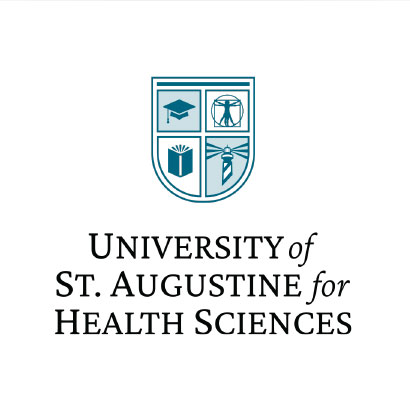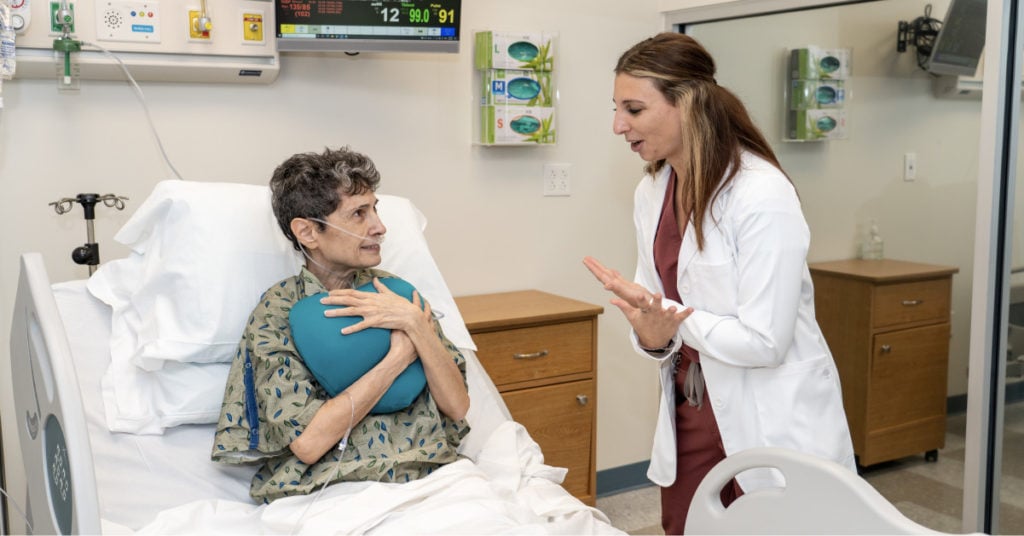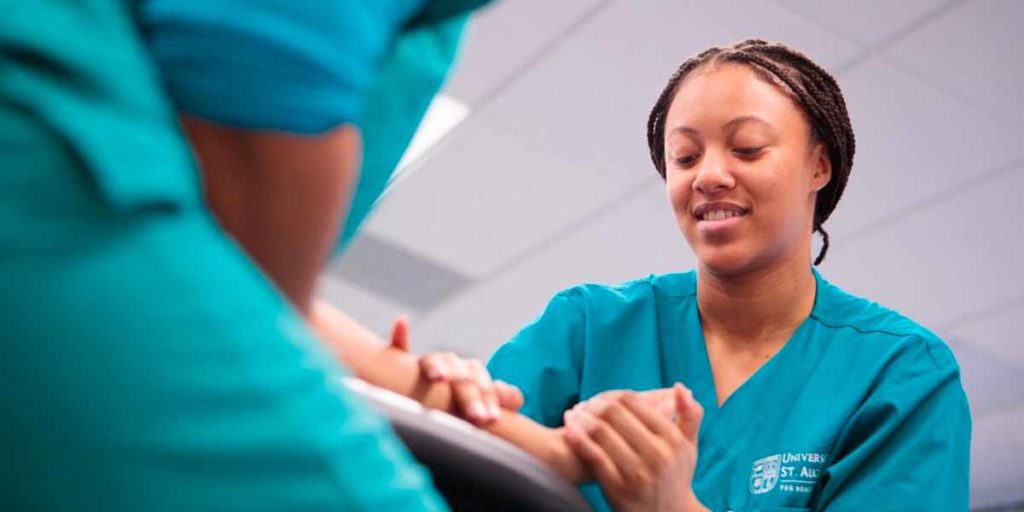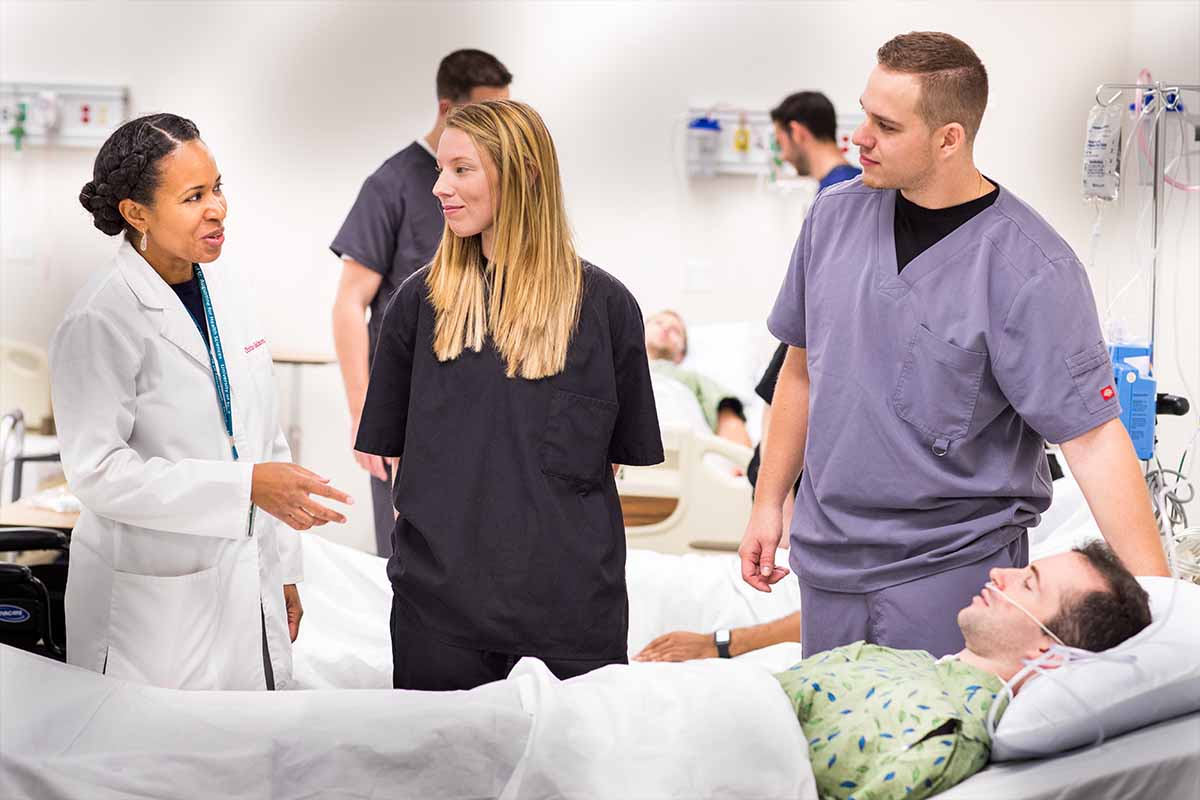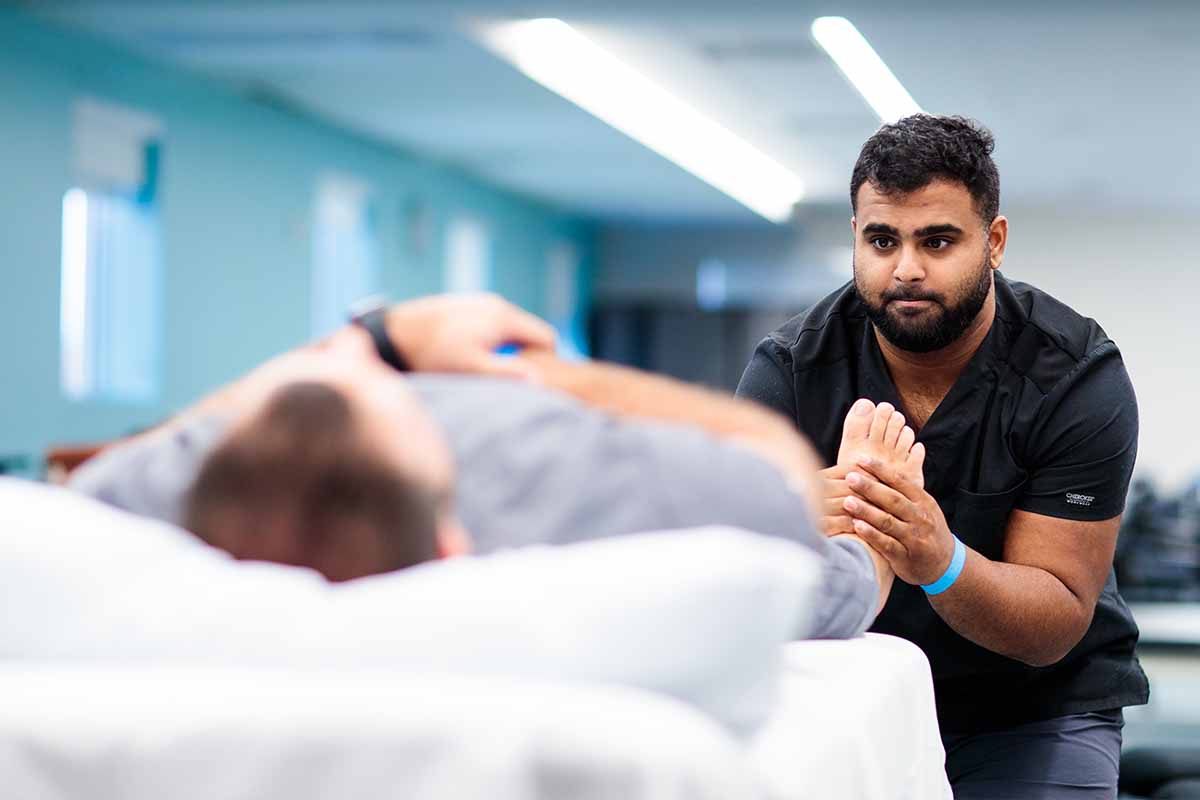

A speech-language pathologist (SLP) diagnoses and treats issues related to speech, language, communication and swallowing disorders.1 For patients struggling to communicate or swallow, these healthcare professionals help them to better engage with the world around them.
Read on to learn more about this exciting and promising career.
Table of Contents:
- What Do Speech-Language Pathologists Do?
- Where Do Speech-Language Pathologists Work?
- What Conditions Do Speech-Language Pathologists Treat?
- How to Become a Speech-Language Pathologist
- FAQ
- Earn Your MS-SLP at USAHS


What Do Speech-Language Pathologists Do?
Speech-language pathologists (SLPs) are communication specialists who treat speech, language, communication and swallowing disorders.1 As part of their work, they may do the following2,1:
- Evaluate and diagnose speech, language, voice and fluency disorders in children and adults
- Develop therapies to help patients improve their ability to swallow
- Identify treatment goals for patients
- Design and implement individualized treatment plans, including speech therapy activities, to help patients meet their treatment goals
- Provide aural rehabilitation for people who are deaf or hard of hearing
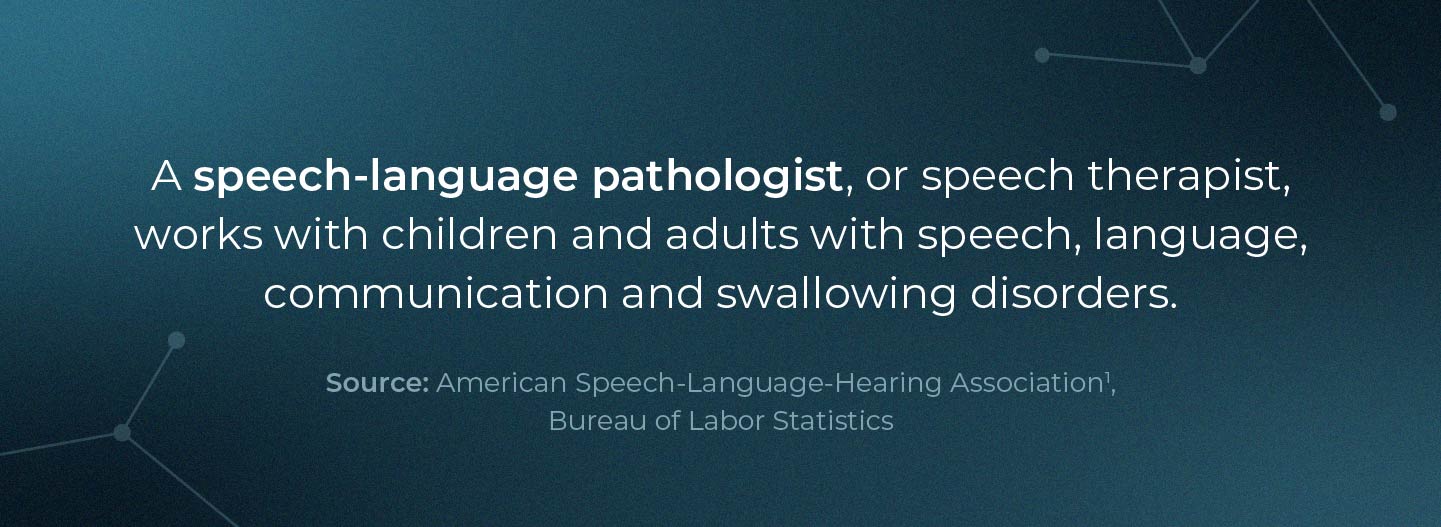

- Teaching patients how to make sounds
- Helping patients improve their voices
- Training patients to maintain fluency when speaking
- Developing exercises to improve the muscles used for swallowing
- Sharing vocabulary improvement strategies with patients
- Assisting patients with strategies to improve their sentence structure
- Demonstrating how to use augmentative and alternative communication (AAC) devices to communicate
Speech-language pathologists may also spend time helping patients and their families navigate their specific disability and treatment options.2 Many speech-language pathologists work as part of a larger healthcare team, including physicians and occupational therapists (OTs) or physical therapists (PTs).
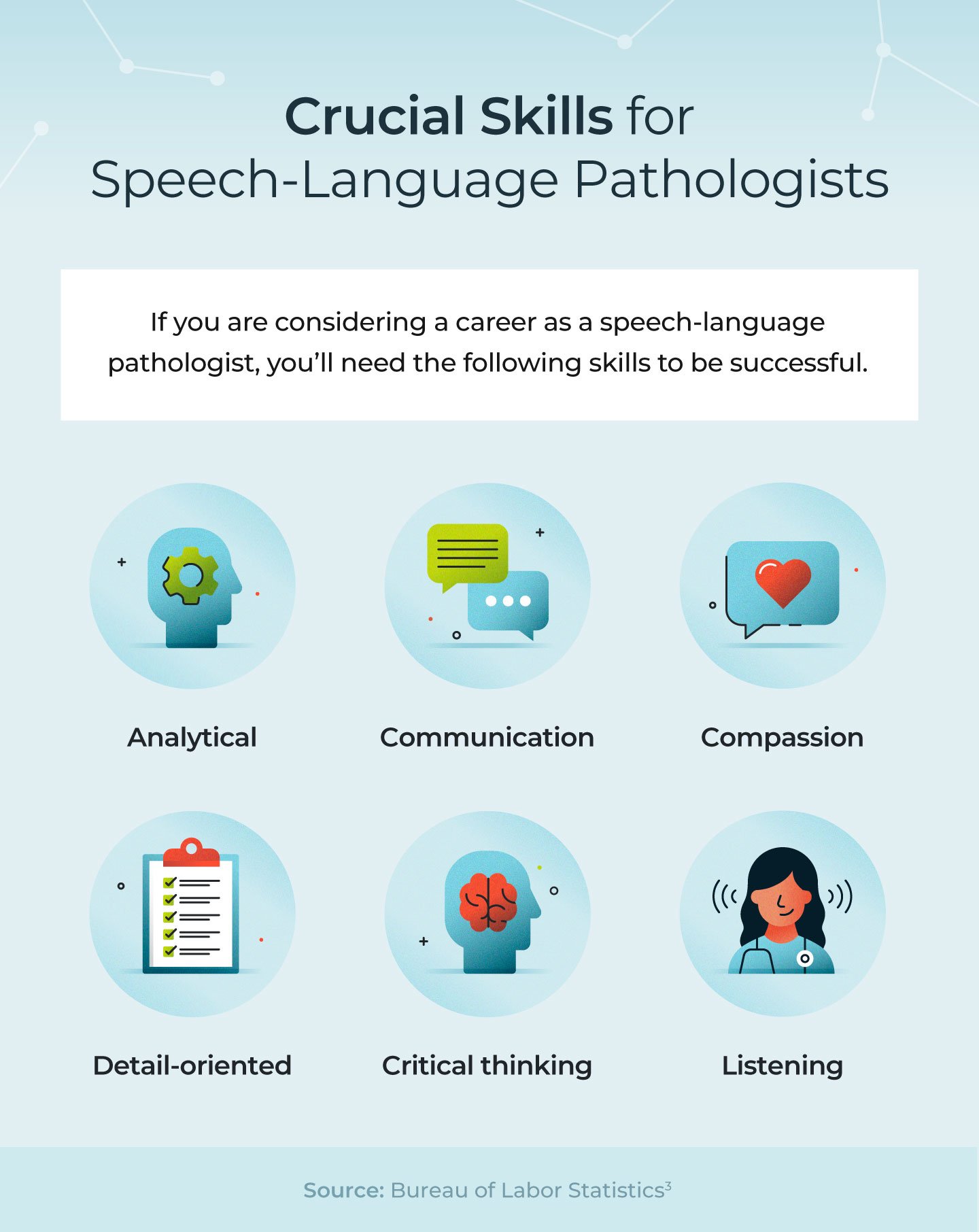

Where Do Speech-Language Pathologists Work?
Speech-language pathologists work in a variety of settings.
| Setting | Percentage4 |
|---|---|
| Education services | 42% |
| Offices of physical, occupational and speech therapists and audiologists | 25% |
| Hospitals | 14% |
| Nursing and residential care facilities | 4% |
| Self-employed workers | 3% |
Most speech-language pathologists work in an educational setting as part of early intervention programs, preschools or K-12 schools.4,5 In addition to the regular duties of a speech-language pathologist, they also develop individualized education programs (IEPs) and collaborate with other educators to ensure students are meeting their educational goals.
Healthcare settings for speech-language pathologists include the following6,5:
- Assisted living facilities
- Private practices and clinics
- Rehabilitation centers
- Long-term care facilities
- Hospitals
- Home health
Some speech-language pathologists also work in corporate settings, providing services to the company or its customers.5 For example, they may work with employees on business speaking skills, such as presentation, accent modification or interviewing.
Local, state and federal government agencies hire speech-language pathologists for public health services.5 The military also employs speech-language pathologists to work with service members and underserved populations.
If you don’t want to work in a clinical setting, you can also work in research or teach at the college or university level.1
With the high demand for speech-language pathologists, you can work full- or part-time.1
What Conditions Do Speech-Language Pathologists Treat?
Speech-language pathologists provide treatment for a range of disorders caused by trauma, illness, developmental delays and medical events such as strokes.2
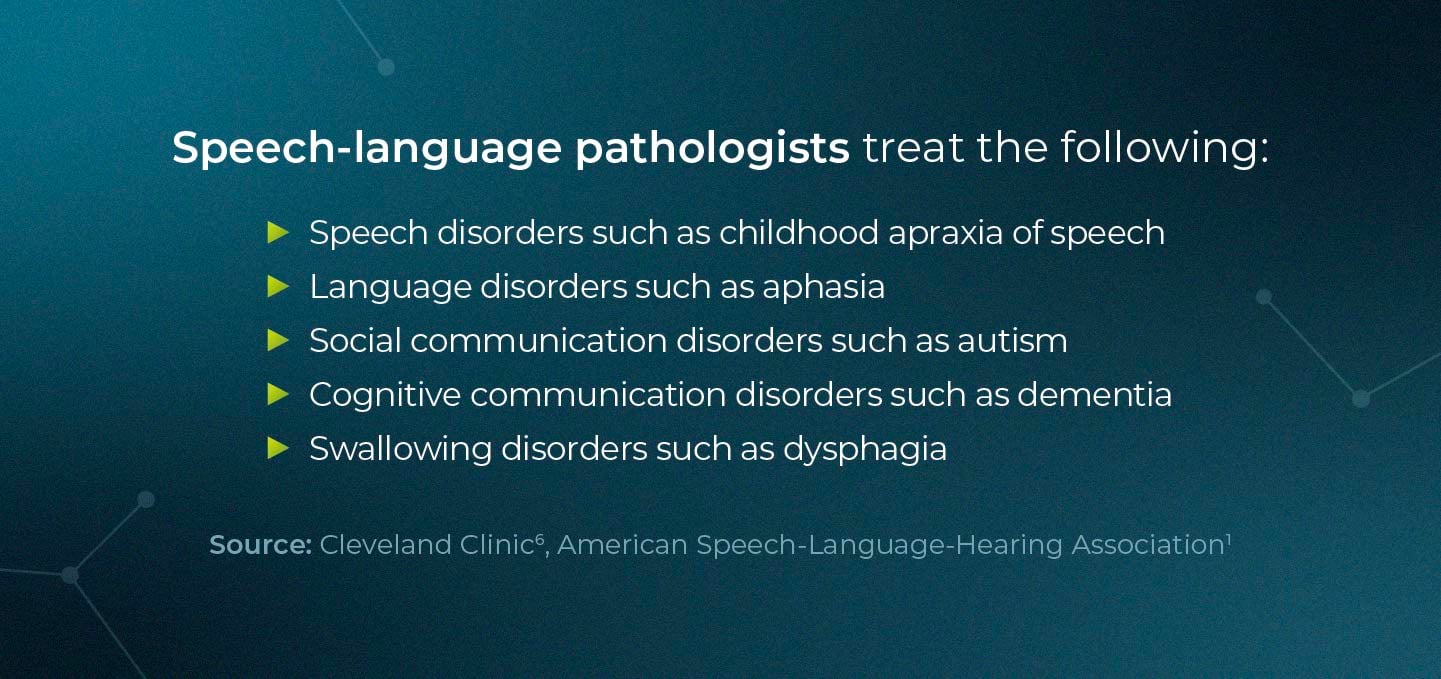

Speech-language pathologists often treat speech disorders, including6:
- Articulation disorders (difficulty controlling muscle movements to create sound)
- Phonological disorders (sounds that are formed correctly in the muscles but don’t sound the way they should)
- Resonance disorders (disruption of sound waves due to conditions such as a cleft palate)
- Speech impairments such as childhood apraxia of speech and stutter
A speech-language pathologist may work with patients struggling with language disorders such as1,6:
- Problems with receptive language (the ability to understand others)
- Problems with expressive language (the ability to express their ideas and feelings)
- Verbal communication
- Written communication
- Selective language impairment
- Aphasia
Speech-language pathologists also treat social communication disorders, which include any condition relating to verbal and nonverbal communication in social settings.1 These types of issues, which include struggles with social cues and taking turns to speak, are often related to autism and traumatic brain injury.6,1
Patients with cognitive communication issues—often the result of stroke, traumatic brain injury or dementia—may also work with a speech-language pathologist.1 These include difficulties with:
- Organizing thoughts
- Paying attention
- Remembering
- Planning
- Problem-solving
Speech-language pathologists also treat swallowing disorders that may occur as the result of illness, surgery, stroke or injury.1,6
Additionally, someone may seek treatment from a speech-language pathologist for issues related to the vocal cord, such as lesions and paralysis or for gender-affirming voice therapy.6
How to Become a Speech-Language Pathologist
While the path to becoming a speech-language pathologist may vary slightly depending on your state, it typically includes the following steps.
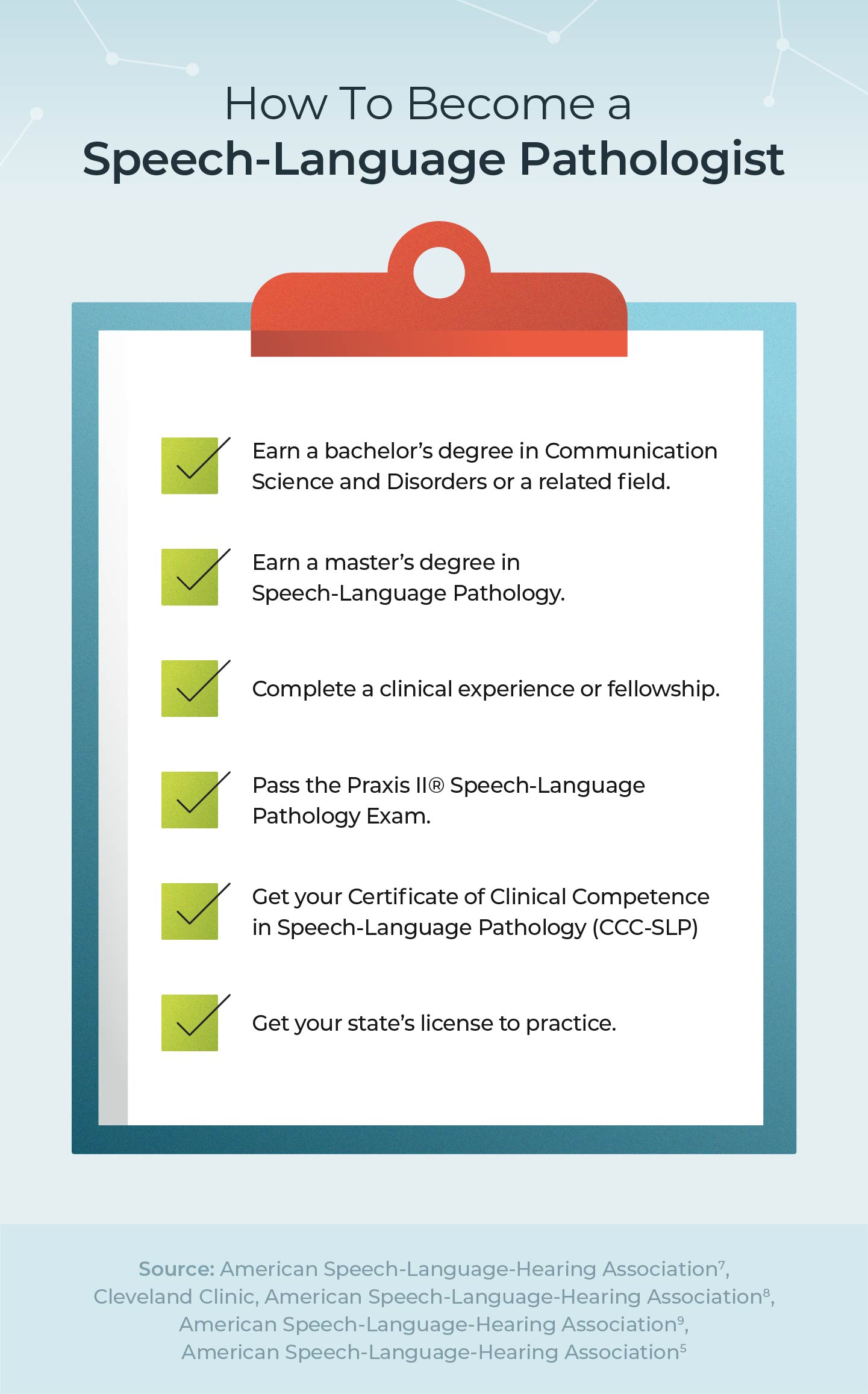

1. Earn a Bachelor’s Degree in a Related Field
The first step involves earning a bachelor’s degree. While a degree in Communication Sciences and Disorders (CSD) is the most common undergraduate degree for speech-language pathologists, you can earn a degree in any related field, such as psychology or health sciences.7
Graduates who don’t earn a bachelor’s degree in Communication Sciences and Disorders may need to take prerequisite courses before enrolling in a graduate program.7 Some schools, including USAHS, offer leveling courses, which provide applicants with the necessary prerequisites to enroll in a graduate program.
2. Earn a Master’s Degree in Speech-Language Pathology
Once you’ve earned your bachelor’s degree and taken any required leveling courses, the next step involves earning a master’s degree in speech-language pathology.6 Ensure the graduate program is accredited by the Council on Academic Accreditation in Audiology and Speech-Language Pathology (CAA).1*
To enroll, you’ll typically need7:
- A minimum of a 3.0 GPA in your undergraduate program
- GRE score
- An essay (sometimes called a statement of purpose)
- At least one letter of recommendation
Some institutions, like USAHS, have additional admission requirements, such as:
- A resume
- A virtual interview (if necessary)
- A minimum of 25 guided observation hours in a speech-language pathology setting with an ASHA-certified speech-language pathologist
The curriculum includes a clinical practicum totaling 400 hours.7 This practicum involves 25 hours in guided clinical observation and 375 hours in direct client/patient contact, up to 20% of which can be clinical simulations.
The end of a speech-language pathology master’s program typically includes a comprehensive exam and a capstone or thesis project of original research.7
3. Complete a Clinical Fellowship Experience
After graduation, speech-language pathologists typically complete a postgraduate fellowship. During this fellowship, a speech pathologist will work under the supervision of an experienced and certified speech-language pathologist for at least 1,260 hours over 36 weeks.6,10
4. Pass the Praxis II Speech-Language Pathology Exam
After completing the clinical experience, speech-language pathologists can take the Praxis Examination in Speech-Language Pathology.8 Most states require a passing score on this exam for licensure.3
A score of 162 is required to pass the exam, and the passage rate in 2020-2021 (the most recent data) was 87.2%.11,12
5. Get Certified
Each state sets its guidelines for licensure of speech-language pathologists. Your state may require you to earn your Certificate of Clinical Competence in Speech-Language Pathology (CCC-SLP), while others may accept it for licensure.13,5,1
Awarded by the American Speech-Language-Hearing Association (ASHA), the CCC-SLP shows employers and patients that you have met rigorous standards that allow you to deliver high-quality care.9
6. Get Licensed in Your State
All states require some form of licensure to practice as a speech-language pathologist, although licensure requirements vary by state.5
7. Additional Optional Steps
Because you are working with patients in a healthcare setting, some employers may require you to be certified in cardiopulmonary resuscitation (CPR) or basic life support techniques.3 Various organizations, such as hospitals, fire departments and community colleges, regularly offer training sessions in the community.14
Any speech-language pathologist interested in teaching at the collegiate level or working as a researcher may need to earn a PhD in Communication Sciences and Disorders.15
FAQ
Learn more about a career in speech-language pathology with these common questions.
What’s the Difference Between a Speech-Language Pathologist and a Speech Therapist?
A speech-language pathologist and a speech therapist are the same thing, but “speech-language pathologist” is the preferred term.6
How Much Does a Speech-Language Pathologist Make?
The median annual salary for a speech-language pathologist is $84,140.16 Your MS-SLP salary will depend on factors such as your experience, location and industry.
What Specialties Are Available in Speech-Language Pathology?
There are four specialties available for speech-language pathologists17:
- Child Language (BCS-CL) from the American Board of Child Language and Language Disorders
- Fluency and Fluency Disorders (BCS-F) from the American Board of Fluency and Fluency Disorders
- Swallowing and Swallowing Disorders (BCS-S) from the American Board of Swallowing and Swallowing Disorders
- Intraoperative Monitoring (BCS-IOM) from the American Audiology Board of Intraoperative Monitoring
Requirements vary based on the type of specialty but generally involve an exam, portfolio review or interview to assess your skills and expertise in the specialty area.
Earn Your MS-SLP with USAHS
“Having practiced with all this technology, I was so much more prepared for my job than my coworkers who went to other schools. I knew just what to do on my first day and now I’m teaching my coworkers about what I learned.”
– Bethany W., MS-SLP Alum
There are many benefits to being a speech-language pathologist, including an impressive salary, job security and the opportunity to make a difference in patient lives.
Pursue your dream of becoming a speech-language pathologist at The University of St. Augustine for Health Sciences (USAHS). Our immersive hybrid Master of Science in Speech-Language Pathology (MS-SLP) program means you can take classes online and still engage in hands-on experience.
The USAHS program takes about five trimesters with three different intake dates (spring, summer and fall) to allow flexibility.Time completion may vary by student, depending on individual progress, credits transferred and other factors. Our program does not require a GRE, and you’ll have access to state-of-the-art technology and virtual and in-person clinical practicum opportunities, including a pro-bono clinic.
Learn more by talking with an enrollment advisor, or apply today.
The Master of Science (M.S.) education program in Speech-Language Pathology {residential Austin, TX; satellite Dallas, TX; both distance education} at the University of St. Augustine for Health Sciences is accredited by the Council on Academic Accreditation in Audiology and Speech-Language Pathology (CAA) of the American Speech-Language-Hearing Association, 2200 Research Boulevard, #310, Rockville, MD 20850, 800-498-2071 or 301-296-5700.
Sources:
- American Speech-Language-Hearing Association, “Speech-Language Pathologists,” American Speech-Language-Hearing Association, https://www.asha.org/students/speech-language-pathologists/.
- Bureau of Labor Statistics, “What Speech-Language Pathologists Do,” Occupational Outlook Handbook, last modified September 2023, https://www.bls.gov/ooh/healthcare/speech-language-pathologists.htm#tab-2.
- Bureau of Labor Statistics, “How to Become a Speech Language Pathologist,” Occupational Outlook Handbook, last modified September 2023, https://www.bls.gov/ooh/healthcare/speech-language-pathologists.htm#tab-4.
- Bureau of Labor Statistics, “Work Environment,” Occupational Outlook Handbook, last modified September 2023, https://www.bls.gov/ooh/healthcare/speech-language-pathologists.htm#tab-3.
- American Speech-Language-Hearing Association, “Employment Settings for SLPs,” American Speech-Language-Hearing Association, https://www.asha.org/students/employment-settings-for-slps/.
- Cleveland Clinic, “Speech-Language Pathologist,” Cleveland Clinic, last modified January 2023, https://my.clevelandclinic.org/health/articles/24602-speech-language-pathologist.
- American Speech-Language-Hearing Association, “Planning Your Education in Communication Sciences and Disorders,” American Speech-Language-Hearing Association, https://www.asha.org/students/planning-your-education-in-csd/.
- American Speech-Language-Hearing Association, “About the Speech-Language Pathology Praxis Exam,” American Speech-Language-Hearing Association, https://www.asha.org/certification/praxis/about-the-speech-language-pathology-praxis-exam/.
- American Speech-Language-Hearing Association, “General Information About ASHA Certification,” American Speech-Language-Hearing Association, https://www.asha.org/certification/aboutcertificationgeninfo/.
- American Speech-Language-Hearing Association, “Speech-Language Pathology Pathway to Certification,” American Speech-Language-Hearing Association, https://www.asha.org/certification/speech-language-pathology-pathway-to-certification/.
- American Speech-Language-Hearing Association, “Praxis Scores and Score Reports,” American Speech-Language-Hearing Association, https://www.asha.org/certification/praxis/praxis_scores/.
- American Speech-Language-Hearing Association, “National Summary Report: Descriptive Statistics of PRAXIS Examination Scores for the Speech-Language Pathology Specialty Test for Test Administration years 2010-2011 through 2020-2021,” American Speech-Language-Hearing Association, last modified September 2021, https://www.asha.org/siteassets/certification/national-summary-report-for-praxis-data-in-slp-2021.pdf.
- Wiley University Services, “State Licensure for Speech Language Pathology: What to Know,” SpeechPathologyGraduatePrograms.org, https://www.speechpathologygraduateprograms.org/state-licensing-overview/.
- Indeed Editorial Team, “How To Earn a CPR Certification in 6 Steps (Plus Benefits),” Indeed, last modified February 2023, https://www.indeed.com/career-advice/career-development/how-to-get-cpr-certification.
- American Speech-Language-Hearing Association, “Consider and Pursuing a PhD in Communication Sciences and Disorders,” American Speech-Language-Hearing Association, https://www.asha.org/students/considering-and-pursuing-a-phd-in-csd/.
- Bureau of Labor Statistics, “Speech Language Pathologists: Pay,” Occupational Outlook Handbook, last modified September 2023, https://www.bls.gov/ooh/healthcare/speech-language-pathologists.htm#tab-5.
- American Speech-Language-Hearing Association, “Clinical Specialty Certification,” American Speech-Language-Hearing Association, https://www.asha.org/certification/clinical-specialty-certification/.
